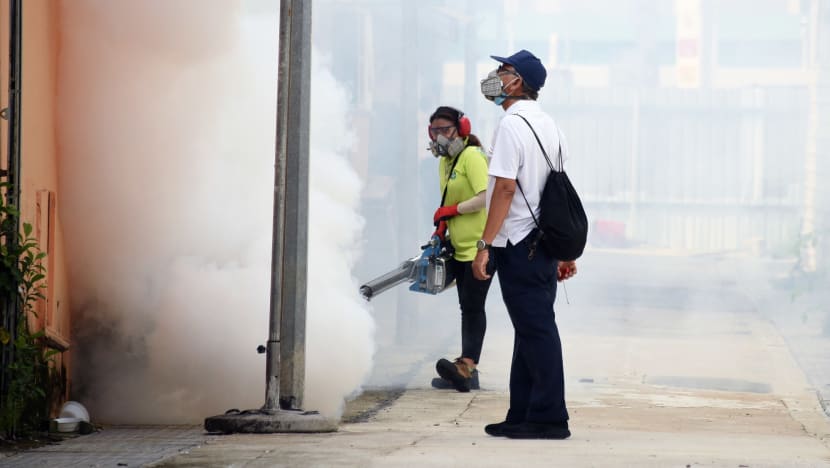Singapore may have access to new dengue vaccine in about a year, says veteran infectious diseases expert

File photo of an NEA officer supervising a fogging operation in Geylang. (Photo: CNA/Try Sutrisno Foo)
SINGAPORE: Singapore may, in the next year, have access to a new dengue vaccine that is suitable for both people who have been infected and those who have not.
Japanese pharmaceutical giant Takeda recently submitted its vaccine candidate for approval in Europe as well as dengue-endemic countries like Singapore, said veteran infectious diseases expert Tikki Pang on Tuesday (Jun 14).
Currently, Dengvaxia is the world's only approved vaccine for dengue - but it is only for those who have had a previous infection.
Takeda’s vaccine would be the first to overcome this limitation if it is authorised for use.
“Maybe within a year you will see (the) Takeda (dengue vaccine candidate) being authorised in some countries,” said Professor Pang, a visiting professor at the National University of Singapore’s Lee Kuan Yew School of Public Policy.
He was speaking to CNA after Takeda and another company MSD made presentations on the progress of their vaccines during the 5th Asia Dengue Summit held in Singapore.
Takeda’s potential vaccine, TAK-003, has been shown to be 84 per cent effective at preventing hospitalisations and 61 per cent effective at stopping symptomatic infection with no important safety risks identified, according to data from a Phase 3 clinical trial published five days ago and presented on Tuesday.
The protection from the vaccine has so far lasted four-and-a-half years since being administered.
Describing the results as “exciting”, Prof Pang said: “There were a lot of very important … advances, even call it an evolution towards … a better vaccine compared to that first one.”
TWO NEW VACCINES WITHIN TWO YEARS?
Prof Pang was also hopeful that MSD's vaccine candidate could possibly be available in two years, given the data from its Phase 1 trial.
“That will be a major step forward in terms of having an improved vaccine over Dengvaxia,” said Prof Pang, who is also an international advisor with Asia Dengue Voice and Action (ADVA), a scientific working group dedicated to dengue vaccine advocacy in the region.
He explained that the difference MSD’s vaccine candidate will bring to the table is the unprecedented possibility of providing almost equal protection against the four types of viruses that cause dengue infection.
The protection that other vaccines offer is more varied across the four types, he said.
“With the data that we have … the vaccine candidate that we have, things look as promising as they can look, with the caveat that dengue is a very slippery character and has surprised people before,” said Dr Louis Macareo, an executive director at MSD leading the development of new vaccines.
THE COVID-19 EFFECT
The pharmaceutical companies and infectious diseases experts said that the COVID-19 pandemic gave vaccination awareness a boost and brought some issues surrounding vaccination to the forefront.
Dr Ellyana Ismail, head of medical affairs at Takeda in Singapore and Malaysia, said that the pandemic gave firms like hers insight into vaccine hesitancy and how information on vaccines needs to be communicated.
“When we talk about stakeholders, or maybe opinion leaders, we realise it's not just the top people, they could be community leaders that will be influential,” she said.
“I think those are the things that we learnt and that boils back down to our strategies as well on how we want to roll out (the vaccine) once we've got the approval.”
"It's an opportunity for people to realise that indeed, without vaccines, you can actually get into trouble with the economy, with health - health delivery systems may go down,” said Professor Lulu Bravo, professor emeritus at the College of Medicine, University of the Philippines, Manila.
Prof Pang similarly said that there has been a silver lining amid the COVID-19 pandemic.
“With COVID-19, there's a crisis, yes, but there's also an opportunity more than anything else. At a big level, it has convinced everybody of the value of vaccination,” he added.
CHALLENGES IN COMMUNICATION
He noted, however, that “there was a lot of resistance” to COVID-19 vaccines and stressed that introducing a new vaccine requires giving people the right information to reassure them.
The biggest challenge now is misinformation and fake news, he said.
“Before social media took off, the amount of fake news and misinformation and hoaxes and propaganda and conspiracy theories were not as bad as it has been during COVID,” Prof Pang said.
“So the challenge of introducing a new vaccine is much greater," he added.
“With any new vaccine, it can never be 100 per cent safe or 100 per cent efficacious. There will always be side effects … you have to weigh the risk versus the benefits and that's the importance of communication."
Agreeing, Prof Bravo said communication is a vital part of rolling out dengue vaccination.
Singapore has been seeing a spike in dengue cases. More than 12,000 cases have been reported this year - up from 5,258 cases in the whole of 2021.
As the country enters the peak dengue season from June to October, authorities have urged everyone to take "immediate action" to get rid of mosquito breeding sites.

















